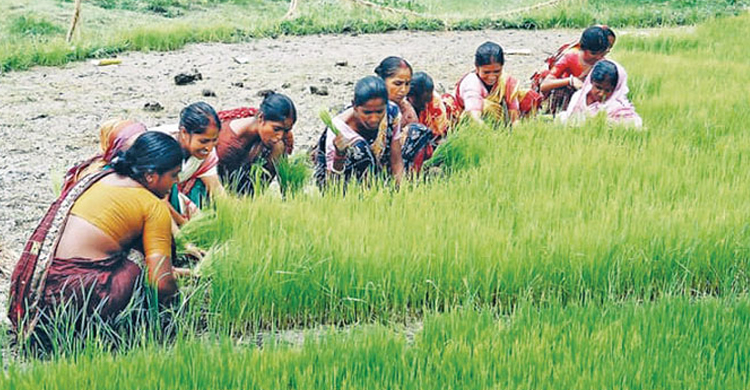Naresh Madhu : Historically the works of women in Bangladesh have mostly been confined to the homestead due to culture, religion, and social restrictions. In a male dominated society like Bangladesh, women have been the victims of religious prejudices, superstitions, oppressions and various kinds of discriminations. However, with the change of the socioeconomic situation of the country, women are breaking through the traditional norms and coming forward to participate in economic and development activities outside their homestead.
The role of women in farm and non-farm activities is important in determining their living standard, dependency burden and saving pattern in households. The rural women in Bangladesh have important contributions in agriculture and in almost every aspects of our society.
Women constitute about half of the total population in Bangladesh and among them about 45.6% are associated with farming society according to information from agriculture sectors.
Women are induced to contribute in farm and non-farm activities by push and pull factors. The push factors mainly characterize financial demands. Women from the poorest families are pushed into farm and non-farm activities due to severe economic necessity. A family with lower income is more likely to increase their family income by involving female members in farm and non-farm activities. On the other hand, a family with high income might reduce the necessity of augmenting income by involving women in the labor force (Kazi & Raza, 1986). The pull factors also attract women for taking part in farm and non-farm activities. Neoclassical economists consider education to be one of the key determinants of women’s entering into the labor market. The higher the education level, the greater is women’s involvement in the labor market (Becker, 1965; Mincer, 1962)
Furthermore, education might make certain jobs more available to women. Therefore, investment in human capital such as education and on the-job training enhances productivity of women, which in turn leads to higher labor earnings. Demographic factors like age and family size are also considered to be important in affecting the labor force participation rates of the women. It has been observed that large family size and dependency burden might push women into the labor force. Other variables like family structure and education level of husband and parents can also be considered as potential determinants or constraints to women’s participation in economic activities. Some other factors that could influence women’s participation in the labor force include availability of jobs, occupation and the distance from the possible place of work (Mincer & Polachek; 1974), etc.
According to the Bangladesh Bureau of Statistics (BBS), 41.7 million people are currently employed in rural economic activities. Of them, about 12.6 million are women engaged in rural areas, especially in the agriculture sector. The BBS reports states that women workers are getting Tk 150 per day, while male workers are getting Tk 350 to Tk 400.
On the eve of International day of Rural Women, farmers and women workers have raised their voice, demanding recognition of women’s contribution to the country’s rural economy, fulfilment of their rights and removal of gender discrimination in this arena. They say women, particularly those working in the agricultural sector, are directly involved in production, processing and marketing of agricultural produce, but their contributions to society remain mostly unnoticed.
Since October 15, 2008, International Day of Rural Women is being observed to recognise the role of rural women, including indigenous women, in enhancing agricultural and rural development, improving food security and eradicating rural poverty.
According to statistics, only 4 per cent of all women and 13 per cent of employed women are casual workers in Bangladesh. Overall, women labourers put in about 80 per cent of the hours that men do and receive about 62-65 per cent of the wages that men receive in the casual labour market.
But they are not getting their wages rightly. This is not created by the government rather it is comes from values and attitudinal behavior of a man or in a society. Gender mainstreaming is the prime even some of the sectors it is one of the important issues. Now the person believes without rooted out the gender discrimination we might not be economically sound in a family or state. To rooted out the gender discrimination and to ensure economical justice for the women they have to be stands on one stage and will have to raise voice and demanded to justice wages. The local government specially women can play a vital role to change attitude of land owners but they are not doing as because they have the limitation about information, knowledge and skill to organize or to raise voice for ensuring economical justice of women farmers.







